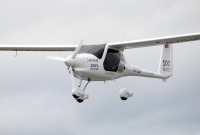Support strong Canadian climate journalism for 2025
A Norwegian company with millions of dollars invested in the Canadian North is weeks away from losing a major contract in the emerging space satellite industry because of a lengthy government delay.
Kongsberg Satellite Services owns seven satellite-reading antennas in Inuvik, N.W.T. The community's location on Canada's northwestern tip makes it an ideal spot for downloading data from the ever-growing number of government-owned and private satellites orbiting the Earth.
The company, known as KSAT, has a contract with the European Space Agency to handle data from its Sentinel satellites, the agency's flagship environmental monitoring program.
However, KSAT needs a licence from Global Affairs Canada. The company applied in 2016, but still hasn't received a full licence.
"The root cause of the problem is legislation that is outdated," said KSAT president Rolf Skatteboe said in a phone interview from Norway.
Canada's laws, which date from 2005, require companies receiving satellite data to be able to control where it is downloaded. Because the Europeans can't control which of their receiving stations the Sentinel satellite would use at any one time, KSAT can't meet that requirement.
The restriction applies even though Canada is an associate member of the European Space Agency.
A 2017 report from McGill University, commissioned by the government, concluded that the legislation dates from a time only governments launched and communicated with satellites. "Remote- sensing activities have since changed significantly and outgrown the confines of the act," it said.
Because of the legislation, KSAT has for years been unable to fulfil its Sentinel contract, which is up for renewal April 1.
"We cannot respond to (the European Space Agency) before we have the licence," Skatteboe said.
Global Affairs Minister Chrystia Freeland can grant an exemption for KSAT, but she can't do that until consultations within the department are complete. Skatteboe, who's been waiting for three years, said he can't wait much longer.
"How do they have to do more consultations now? Why do they have to send everything to the minister's office before she can deal with the exemption?"
A 2017 industry report estimated global revenues from Earth observation satellites at $100 billion a year, growing at 11 per cent.
A Global Affairs spokesman said Ottawa is aware of the industry's potential importance.
"Satellite licences require a thorough vetting, including a national security check, which takes time," John Babcock said in an email.
"We welcome and are working to support the development of the satellite industry in Inuvik, which offers important opportunities for economic development for the town and for the Northwest Territories."
Babcock said officials have visited the Inuvik site. Provisional licences have been issued, which helps some of Skatteboe's clients but not the Sentinel contract.
Skatteboe said the department has done its best within the legislation. "(Global Affairs Canada) has been helpful in their approach."
But he points out a nearby government-owned satellite facility has been fully licensed. It hosts antennas owned by the German Aerospace Centre and Sweden's SSC.
If KSAT loses the Sentinel contract, it'll be years before it can try again. That may be too long, said Skatteboe. KSAT has invested $50 million in Inuvik and has six local people working on site.
"The antennae have been sitting there for five years," he said. "I really have a tough time leaving it there for three or four more years if we're not able to offer it to ESA."






Comments